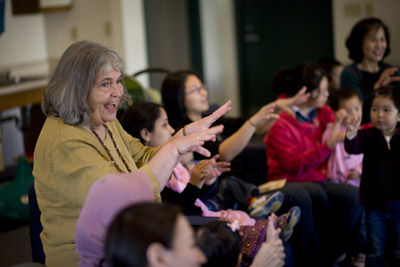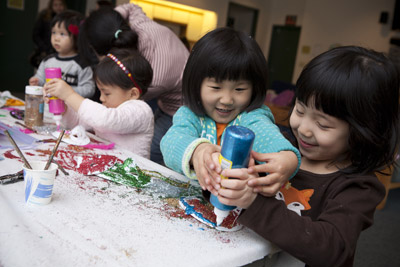Fostering community at Cornell's 'mini United Nations'
By Nancy Doolittle

Sandwiched between the Appel athletic fields and the Robert Trent Jones Golf Course on North Campus, the unassuming Hasbrouck Apartments house international visiting professors and graduate students.
Thanks in part to staff member Candace Mingins '70, Hasbrouck's youth and family coordinator for 14 years, these residents form a community.
"We support the scholars by supporting their families," Mingins says. "When they know their families are doing well, they can concentrate on their studies." Many residents come from extended families, so having daily contact with each other helps them feel less isolated, she says.

Mingins engages parents and their children in activities that orient newcomers to the Ithaca area and helps them get to know and learn from each other. She works with children from newborns to teens. About half of Hasbrouck children are under age five. Currently representing 47 countries, there are 89 families with about 120 children living at Hasbrouck as well as couples and singles without children.
Mingins organizes a weekly morning program for young children and their caregivers and two after-school programs for school-age children and their parents. "The parents come to the community center to work with their children on such art projects as Chinese paper-cutting or cooking projects such as making Brazilian candy or Chinese dumplings. Having the adults and children play together really builds community," she says.
Hasbrouck families also engage in community projects: celebrating their diverse cultures by redecorating an arch each year; gathering monthly for a potluck dinner; carving ice sculptures; or participating in activities and holidays that teach them about U.S. culture as well as each other's. Each year the children compile a yearbook for mementos of their time at Cornell.
Mingins also serves as a liaison between the adults and community service providers. "Some of the residents come with minimal English-speaking skills. We help them with shopping, paying a traffic ticket or finding health or child care providers," she says.
Hasbrouck staff members also invite representatives from social service agencies and from such university offices as the Cornell University Police to the community center to introduce families to resources they might need. Before each semester begins, the center holds an event with representatives from Cornell and community agencies such as Cooperative Extension, and information about English as a second language classes, for example.
Mingins says she has found her years at Hasbrouck fulfilling. "It's a mini-United Nations up here, with people from all over the world. I applaud Cornell for developing housing and programming dedicated to graduate students and their families, meeting, in particular, the needs of international students and other visitors to the United States."
Mingins says that Hasbrouck residents often email her after they have left Cornell or come back to visit years later, bringing their children with them. "They recall their graduate experience as a time when they were intellectually challenged, when their children were born, when they made lifelong friendships and were looking forward to what the future might hold," she says.
Media Contact
Get Cornell news delivered right to your inbox.
Subscribe